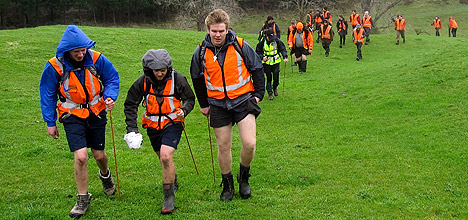Five simple rules that comprise the recently developed Outdoor Safety Code could go a little bit further, says Western Bay of Plenty Search and Rescue Coordinator Craig Madden.
The rules made by the outdoor and tourism sectors are: plan your trip, tell someone, be aware of the weather, know your limits, take sufficient supplies.
Search and Rescue are hoping people will take on board the five simple rules they are promoting in their new Outdoor Safety Code.
'Some of the more specific things, like ‘take sufficient supplies', it is not just water, food, and clothing,” says Craig, 'but it should also be a compass, a map, and a personal locator beacon.”
They are worth the price and can now be hired, as can mountain radios – while a radio can be valuable they don't help much with lost or disoriented people, a personal locator beacon removes the search element, says Craig.
Even day trampers should take sufficient food to keep energy levels up if they are forced to stay out overnight. It can prevent a delay from becoming a survival situation.
Since July there have been 26 Search and Rescue call outs in the Western Bay of Plenty, with nearly half of them, 10, being land searches.
'Summer is a busier time for both sea and land based searches.”
'Most summer ones are water searches mainly for recreational fishermen. We also have a few land searches in summer, just because that's when the biggest percentage of trampers are in the hills.
'But in summer because of the generally better weather conditions people don't freak out as much. It tends to be the weather that causes problems in land searches.”
The purpose of the Outdoor Safety Code is to promote the simple messages most Kiwis using the outdoors should know and can pass onto visitors, both domestic and overseas, says national police manager for emergency management Inspector Gerard Prins.
'We hear stories of visitors attempting the Tongariro Alpine Crossing in jandals while others don't carry supplies because they assume there's a shop on the Heaphy,” says Gerard.
'Rather than be the ambulance at the bottom of the cliff we want to help ensure all visitors don't get into trouble in the first place.”
The group backing the Outdoor Safety Code includes the NZSAR Council, Mountain Safety Council, LandSAR (Land Search and Rescue), New Zealand Police, Department of Conservation, Tourism New Zealand, ACC, Tourism Industry Association, SPARC, and the Walking Access Commission.



0 comments
Leave a Comment
You must be logged in to make a comment.